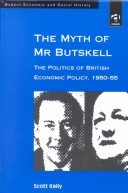It is often assumed that a general consensus existed between the post-war Labour and Conservative governments in matters of economic policy. Indeed, by 1954, "The Economist" was able to satirize the situation with the invention of "Mr Butskell", a fictitious political figure created by an amalgamation of the names of Hugh Gaitskell and R.A. Butler. For decades afterwards the character of Mr Butskell came to personify the idea of a consensus over economic policy that was only broken with the election of the Thatcher government in 1979. The longevity of the Butskell figure suggests that the post-war consensus was a given fact, but on what basis are these assumptions made? The purpose of this work is to reassess the situation by examining the conduct of economic policy from the moment Hugh Gaitskell joined the Treasury in 1950 as Stafford Cripp's deputy, to Rab Butler's departure in December 1955.
Through a careful examination of the evidence, it is demonstrated that contrary to the prevailing view of this period, there was no consensus about the ways in which the economy should be managed, and that there was a sustained argument over the use of physical controls, monetary policy and direct taxation. The book examines Gaitskell's economic thought and the underlying economic and political rationales for the positions taken by the Labour and Conservative Parties. In examining the structure of economic policy making, this book demonstrates that ministerial determination of policy is far more important than previous scholars have assumed, which explains why a developing consensus among civil servants about the conduct of economic policy is not necessarily reflected in outputs.
- ISBN10 075460604X
- ISBN13 9780754606048
- Publish Date 21 May 2002
- Publish Status Out of Print
- Out of Print 16 June 2012
- Publish Country GB
- Publisher Taylor & Francis Ltd
- Imprint Ashgate Publishing Limited
- Format Paperback
- Pages 250
- Language English
